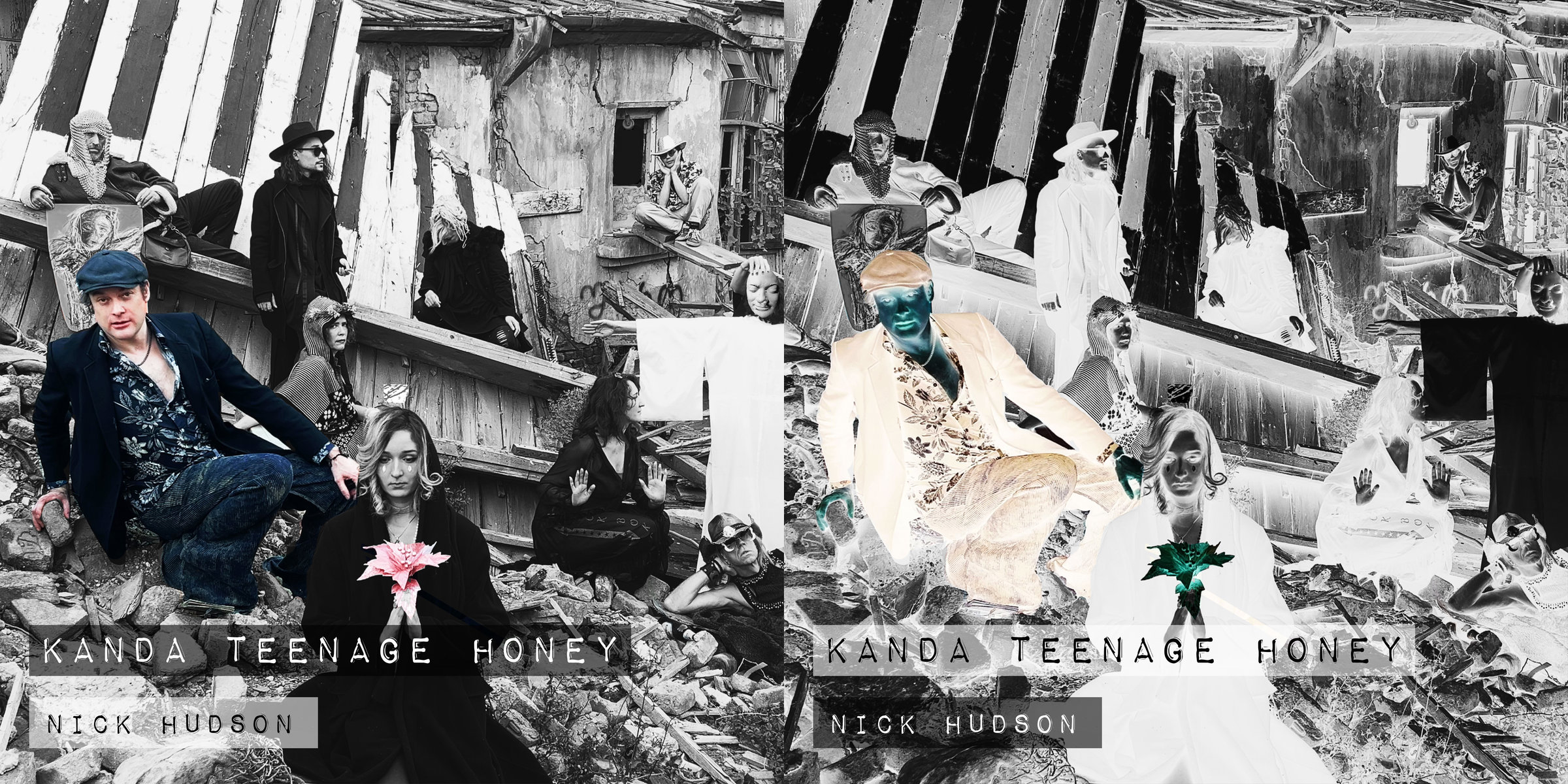By Keith Walsh
British born but living in Post-Soviet Tbilisi, Georgia, Nick Hudson is a singer/songwriter with a peculiarly sharp focus on life’s dramas and the emotions they inspire. With his intricate lyrics and theatrical baritone guiding the way, his new album Kanda Teenage Honey, is a sonic trip through pain and growth, and of alternatively colorful and devastating landscapes. There’s an experimental undercurrent to Kanda Teenage Honey, along with masterful songwriting and inspired performances drawing their strength from the considerable talents of Hudson and his musical collaborators. (My interview with Hudson is at Popular Culture Beat.)
The sixteen-song set begins with grand, elegant tranquility of “Khevsureti,” which evokes David Bowie at his mature best (it is reminiscent of Bowie’s song “Sunday,” the opener of his return to work with Tony Visconti, 2002’s Heathen). Then comes the sweetly baroque pop of the single “For My Silence,” then to the dramatic sci-fi drama of “Sky Burial While Alive,” which erupts into a goth leaning electronic song, while musing on the fate of dictators , signaling the treasures to be found on the daring and eclectic album to come.
Another commentary on the tragedy of the hubris of tyrants, “Hollow Man” is a post punk rocker with new wave and more Bowie-esque elements, mostly of the Brian Eno variety, developing into a plaintive piano ballad with prog features. “This Heat” is a piano-based song telling a traveler’s story in picturesque musical and lyrical detail. Hudson’s mastery of the piano and his voice feature strongly here.
“Hachiko” is an acapella folksong with a story about family and eternity. “Archipelago” tells of the tragic loss of a first love framed in a tender piano ballad. Here and elsewhere on Kanda Teenage Honey the Rufus Wainwright vibes are strong. Hudson gives a clue to his theatrical influences by name dropping Stephen Sondheim on “Archipelago.” “Bardo” is a mysterious experimental piece with a spoken word introduction, that bursts into noise rock.
“Hunters” is a piano ballad that the protagonist rationalizing past adventures with romantic recollections. “Unspent Youth” features the lovely soprano vocals of Poppy Efemey, and is a elegy to the trials around growing into maturity. Efemey’s vocals come close to the sound of a theremin, yet with the organic touch that only a human voice can offer. Her presence signifies perhaps a muse guiding the song’s protagonist. “Seva” is a moody instrumental with a spoken word performance layered over. While “Seva” is a Hindu word describing selfless service to others, the spoken word piece composed and spoken by Vsevolod Osupov is in Russian.
“In Praise Of Venerable Jorge” features pristine classical guitar work by Samuel Gottlebe, with a relaxed pace telling a clever story advising one to consider discretion as a wise tactic in conducting one’s affairs. Here and elsewhere, the comparison of Hudson’s wit and vocal style to that of Morrissey, but that’s almost too facile a comparison. Besides, Hudson’s voice has a sweetness that, while present in earlier work including with The Smiths, is harder to find in Morrissey’s voice today.
“Catherine In The Curate’s Garden” is an ethereal piece with organic sounding pads evolving beneath Hudson’s voice, and a narrative where spirituality and sensuality intersect. I hear sounds related to a harmonium and sitar, but these could very well be synthetic. Kianna Blue is credited as “Issa G Thang” on this track, but other clues are not available. “Ortolan” tells of other manly adventures, of growing up through travel, with simple piano accompaniment. Like the titular bird of the song, Hudson is a spy, free spirited creature.
“Bad Ghost Vs. Good Boy” finds Hudson playing with stereotypes of queerness and possible dramas, accompanied by Gottlebe’s classical guitar again, in a moment of beautiful serenity. Due to the strength of these songs and the tenderness of Hudson’s voice, simple instrumentation is quite effective. “Danube Blues” is a spooky tale of a soul’s desire for a saint’s relic to alleviate his suffering, with piano accompaniment recorded in lo-fi fashion on Hudson’s childhood piano and glossed up by producer Toby Driver in the mixing process.
As a man of the world still informed by a degree of innocence, Hudson fills his songs with bittersweet depictions of a world constantly provoking us with its contradictions. His theatrical baritone and his sense of humor are ideal companions to his darkly optimistic vision, while his skilled piano playing and his love of experimental sonics elevate his stories to sublimity. And while Hudson documents his world with precision and sensitivity, he avoids the trap of giving into bitterness, and perhaps that’s down to his ability to see and hear the beauty in darkness, by representing it in musical form.
Kanda Teenage Honey was wonderfully mixed by Toby Driver and mastered to analog tape by Paul Pascoe.
Nick Hudson On Bandcamp
‘Kanda Teenage Honey’ On Spotify
Nick Hudson On Soundcloud
‘Kanda Teenage Honey’ Album Teaser
Nick Hudson On Facebook
Nick Hudson On Instagram
‘Subverting Forms’ Interview With Nick Hudson
finis
